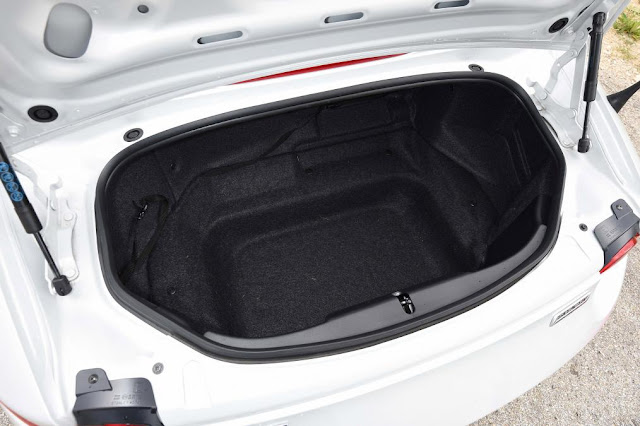Mazda is offering two flavours of the MX-5. As well as the 1.5-litre model, there’s a 2.0-litre with an extra 29bhp – and this is our first drive of it.
That extra 29bhp may not sound like much, but it cuts the car’s 0-62mph sprint time by a second to 7.3 seconds. Top speed is up, too, but by a far less relevant 5mph to 133mph. There is a penalty to pay, though – the 2.0-litre engine is around 25kg heavier than the 1.5. While this extra mass is up front, the majority of buyers shouldn’t be able to discern any serious loss in steering response.
Given its extra power, the 2.0-litre also benefits from a front strut brace and bigger brakes. Top-spec Sport and Sport Nav models get stiffer Bilstein dampers which keep the car more taut through corners, although this does reduce ride comfort.
The 2.0-litre also features another key upgrade – a limited-slip differential. You could argue a slip diff is wasted on a car with such a modest output. But ask anyone who has driven previous generation MX-5s both with and without a diff on a damp roundabout, and they’ll attest that it’s easier to provoke and control tail-out antics with one fitted.
Throw in better stopping power from those larger brakes, and the 2.0-litre simply builds on what is an already fine-driving, cheeky car.
Talk to Mazda engineers off the record, and they’ll whisper the 1.5-litre is the purer car and closer to the original MX-5’s ethos – it’s as light as possible and loves to rev; with peak power at 7,000rpm. However, the US likes to supersize both its meals and its cars, and that’s why the 2.0-litre version exists. With a third more torque, it delivers better mid-range pick up and reaches peak power 1,000rpm sooner, meaning you don’t have to work the engine so hard.
There’s an £850 premium for the larger engine, which incidentally is also slightly more costly to tax and returns around 6mpg less, both trivial matters for roadster buyers.
Really, though, until we drive both versions back-to-back on the same roads, which MX-5 you go for probably comes down to this. If you like a back-to-basics driving experience, the 1.5 is the car for you, but the 2.0-litre is the serious one that goes as good as it looks.
That extra 29bhp may not sound like much, but it cuts the car’s 0-62mph sprint time by a second to 7.3 seconds. Top speed is up, too, but by a far less relevant 5mph to 133mph. There is a penalty to pay, though – the 2.0-litre engine is around 25kg heavier than the 1.5. While this extra mass is up front, the majority of buyers shouldn’t be able to discern any serious loss in steering response.
Given its extra power, the 2.0-litre also benefits from a front strut brace and bigger brakes. Top-spec Sport and Sport Nav models get stiffer Bilstein dampers which keep the car more taut through corners, although this does reduce ride comfort.
The 2.0-litre also features another key upgrade – a limited-slip differential. You could argue a slip diff is wasted on a car with such a modest output. But ask anyone who has driven previous generation MX-5s both with and without a diff on a damp roundabout, and they’ll attest that it’s easier to provoke and control tail-out antics with one fitted.
Throw in better stopping power from those larger brakes, and the 2.0-litre simply builds on what is an already fine-driving, cheeky car.
Talk to Mazda engineers off the record, and they’ll whisper the 1.5-litre is the purer car and closer to the original MX-5’s ethos – it’s as light as possible and loves to rev; with peak power at 7,000rpm. However, the US likes to supersize both its meals and its cars, and that’s why the 2.0-litre version exists. With a third more torque, it delivers better mid-range pick up and reaches peak power 1,000rpm sooner, meaning you don’t have to work the engine so hard.
There’s an £850 premium for the larger engine, which incidentally is also slightly more costly to tax and returns around 6mpg less, both trivial matters for roadster buyers.
Really, though, until we drive both versions back-to-back on the same roads, which MX-5 you go for probably comes down to this. If you like a back-to-basics driving experience, the 1.5 is the car for you, but the 2.0-litre is the serious one that goes as good as it looks.

























0 komentar:
Posting Komentar